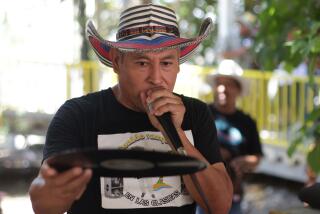Tracking down Colombia’s missing manhole covers
Reporting from Bogota, Colombia — The clue that cracked the case of Bogota’s vanishing manhole covers came from a GPS chip embedded in one of the strangely coveted items.
Thieves steal a stunning 10,000 manhole covers a year from the streets of the Colombian capital, lured by their value as scrap or as contraband resold to sewer systems elsewhere in the country.
Normally the thefts of the iron or composite plastic covers go unchallenged in the face of weak law enforcement and the menacing mafias who control the lucrative trade. The city’s water department sees the thefts — which amount to 4% of its 250,000 covers every year — as a cost of doing business.
But Gildardo Pineda, whose Bogota-based manufacturing company is a major supplier of the city sewage system’s manhole covers, fought back when thieves targeted him too.
Since discovering a “shrinkage” in the inventory at his factory two years ago, he has used satellite-monitored GPS chips and an undercover private investigator to trace 650 of Bogota’s stolen covers to the city of Neiva, about 150 miles southwest of the capital. Many still showing Bogota’s frog logo, the covers had been installed in Neiva streets.
In November, Pineda filed a lawsuit against the Neiva utility and its sewer system’s contractors and hardware suppliers, accusing them of receiving stolen property. This month, that town’s prosecutor opened an investigation of Pineda’s allegations that the firms and city utility officials had conspired in a scam.
“As a company, we are happy the satellite tracking system worked,” said Pineda, a soft-spoken paisa, as natives of Antioquia province are called. “But we are very upset that small-time street hustlers have been replaced by big contractors, prosperous hardware stores and a public company.”
In a brief interview, a spokesman for Neiva Public Cos. acknowledged that some manhole covers in its sewer system were stolen property. But he said the utility acted in good faith, thinking it was buying them as new from reputable contractors and hardware concerns.
The Neiva city attorney’s office did not respond to a request for comment on the case.
The thefts have come as a surprise to Bogota utility officials, because copper and steel items are the most coveted objects for scrap and contraband, said an official who spoke on condition he remain unnamed. But the costly synthetic covers now being ordered by most cities to frustrate the metal recyclers have created huge potential profits for thieves.
Pineda got involved in March 2010, when he discovered that dozens of manhole covers about to be delivered to the Bogota sewer system had been stolen from his inventory over several months. An undercover informer quickly identified as suspects several employees who insisted on working during shifts when supervision was light.
What Pineda couldn’t figure out was where and to whom his nonrecyclable manhole covers, each weighing 120 pounds, were being sold. To determine that, he got permission from the Bogota water company to randomly insert GPS chips into three of every 100 manhole covers he made. (Before that, the utility had limited its suppliers to inserting chips in only one cover per 100 because of the cost of satellite tracking services, which can run as much as $1,800 per hour, Pineda said.)
The tracking service quickly traced three of his stolen covers to Neiva, so Pineda dispatched private eye Jorge Izkierdo, a former national police intelligence officer, to the town. His survey of Neiva city streets turned up hundreds of covers stolen from Bogota.
Izkierdo’s conversations with city officials revealed that the stolen covers were coming mainly from two hardware firms, which he alleged had acted as fences for thieves. Those suppliers, he charged, resold the covers to public works contractors, which then billed the city for new covers at $300 each.
Most company executives might have forgotten the case, for fear of reprisals or to avoid the expense of a lengthy investigation. Not the 56-year-old Pineda, who said that wouldn’t do for someone like him, a native of the town called El Santuario, where people are known for courage, entrepreneurship and obstinacy.
He said he had ignored more than 1,000 extortion threats and even burned down his own farmhouse on the outskirts of Bogota rather than give in to leftist guerrillas who demanded monthly “vaccinations,” or a slow drip of payments in money and livestock.
“The only thing we from Santuario fear is being afraid.”
Kraul is a special correspondent.
More to Read
Sign up for Essential California
The most important California stories and recommendations in your inbox every morning.
You may occasionally receive promotional content from the Los Angeles Times.










